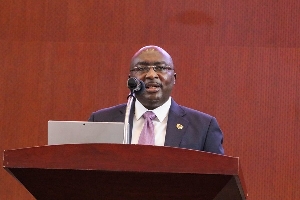- Home - News
- TWI News | TV
- Polls
- Year In Review
- News Archive
- Crime & Punishment
- Politics
- Regional
- Editorial
- Health
- Ghanaians Abroad
- Tabloid
- Africa
- Religion
- Election 2020
- Coronavirus
- News Videos | TV
- Photo Archives
- News Headlines
- Press Release
Editorial News of Monday, 13 November 2023
Source: ghanaiantimes.com.gh
Editorial by Ghanaian Times: 2024 budget must focus on widening the tax net
There is no denying the fact that Ghanaians are going through economic challenges, some through external factors and others self-inflicted.
The external factors have affected countries all over the world leading to economic volatilities over the last three years and Ghana has not been an exception.
For the record, the Ghanaian economy experienced rippling negative impacts from the COVID-19 pandemic, global financial tightening, and the Russia-Ukraine conflict, which worsened Ghana’s fiscal and debt vulnerabilities.
This was further worsened by the downgrade of credit rating and loss of international market access by the end of 2022. This, in turn, constrained domestic financing options, forcing the country to rely heavily on the central bank for funding.
Other challenges the economy faced include high government debt, particularly energy sector debt, and low revenue mobilisation due to the fact that out of a population of 31 million, with over 14 million potential taxpayers, only six million file annual tax returns.
Determined to resolve the economic challenges, the government last year, focused the budget review on revenue and tax administration enhancement measures for economic recovery. That, according to the government, was important to ensure effective management of tax expenditure and to enhance revenue mobilisation.
Indeed, the budget for 2023 introduced some intense tax revenue and expenditure measures, which among others included the removal of selected VAT exemptions, complete removal of discounts on benchmark values for specific items, and E-Levy reforms to close loopholes/leakages. To further improve patronage and enhance yield, implementation of the unified property rate collection, introduction of the Growth and Sustainability Levy (GSL), implementation of the VAT E-Invoicing system to enhance compliance, increasing VAT rate from 12.5% to 15%, revision of excise taxes for selected items, revision of income-based taxes were also intensified to restore macroeconomic stability and achieve debt sustainability among others.
In spite of all the efforts, it appears the measures did not yield the desired result as the country continues to record revenue shortfalls and, therefore, needs to introduce further measures to rake in more revenue.
It is against this backdrop that some economists are advising the government not to introduce new taxes in the 2024 budget but rather initiate new measures to broaden the tax net to shore up its revenue rather than the traditional approach of burdening the existing taxpayers through the hiking of taxes and introducing new ones
According to them, it was important that new initiatives and strategies were deployed in the 2024 budget to improve tax collection to shore up government revenue and also outline measures to help address the macroeconomic challenges such as high cost of capital, deficit, and inflation bedeviling the country.
The Minister of Finance, Ken Ofori-Atta, is expected to present the 2024 Budget and Economic Policy of government to the Parliament on Wednesday in line with the Public Financial Management Act.
While supporting the position taken by the economists, the Ghanaian Times would like to urge the government to introduce measures that would bring back confidence in the economy and address the socioeconomic difficulties Ghanaians and businesses are going through.
Although it is expected that the government may be pushed to pursue an austere budget under an International Monetary Fund program to bring down growing public debt and deficit or flexible policies to drive economic and business growth, we hope that the measures would not deepen the woes of the already suffering masses.
We hope that the government will consider all the suggestions being put forward so that we can have an inclusive budget that we can all work within 2024.











